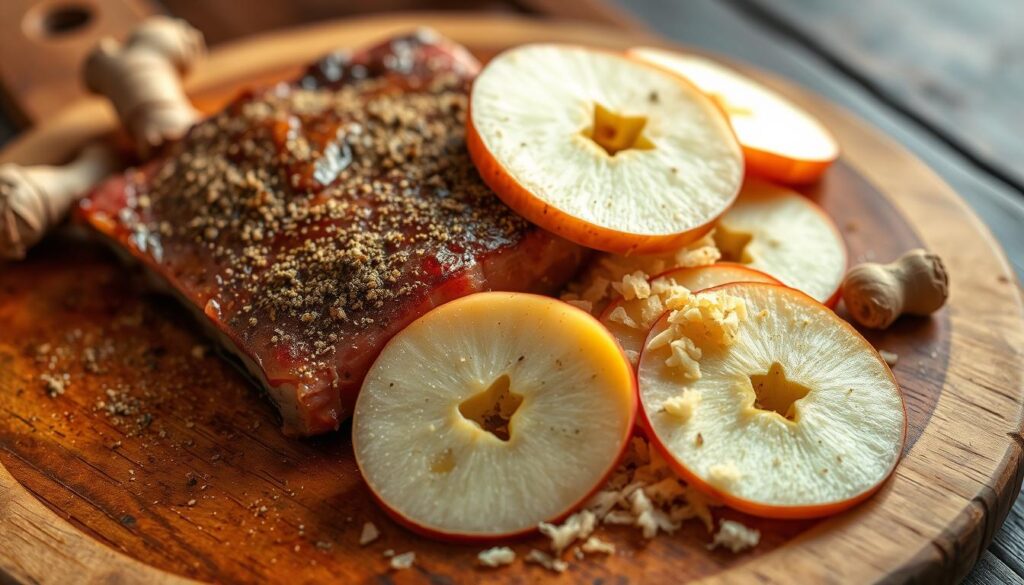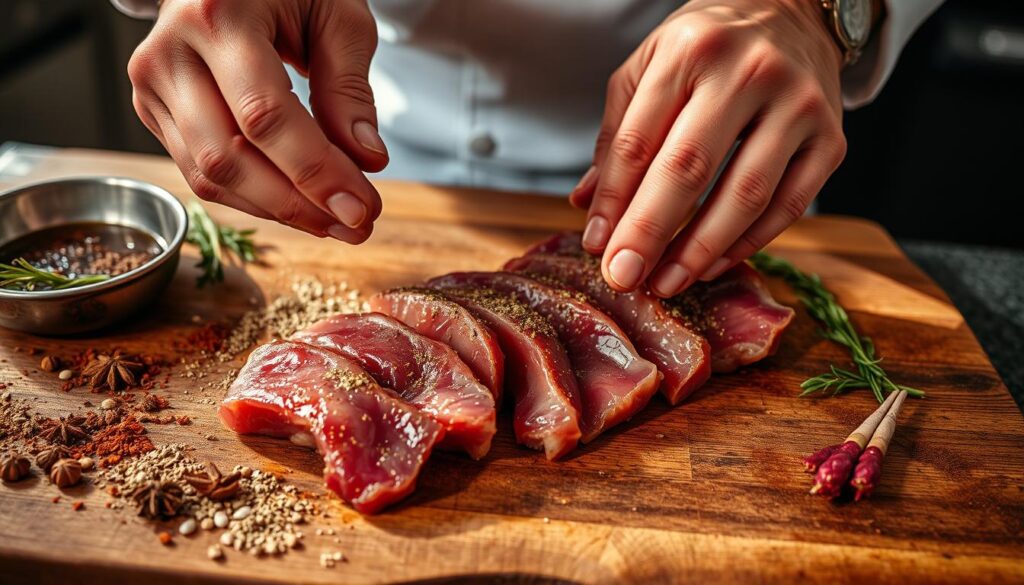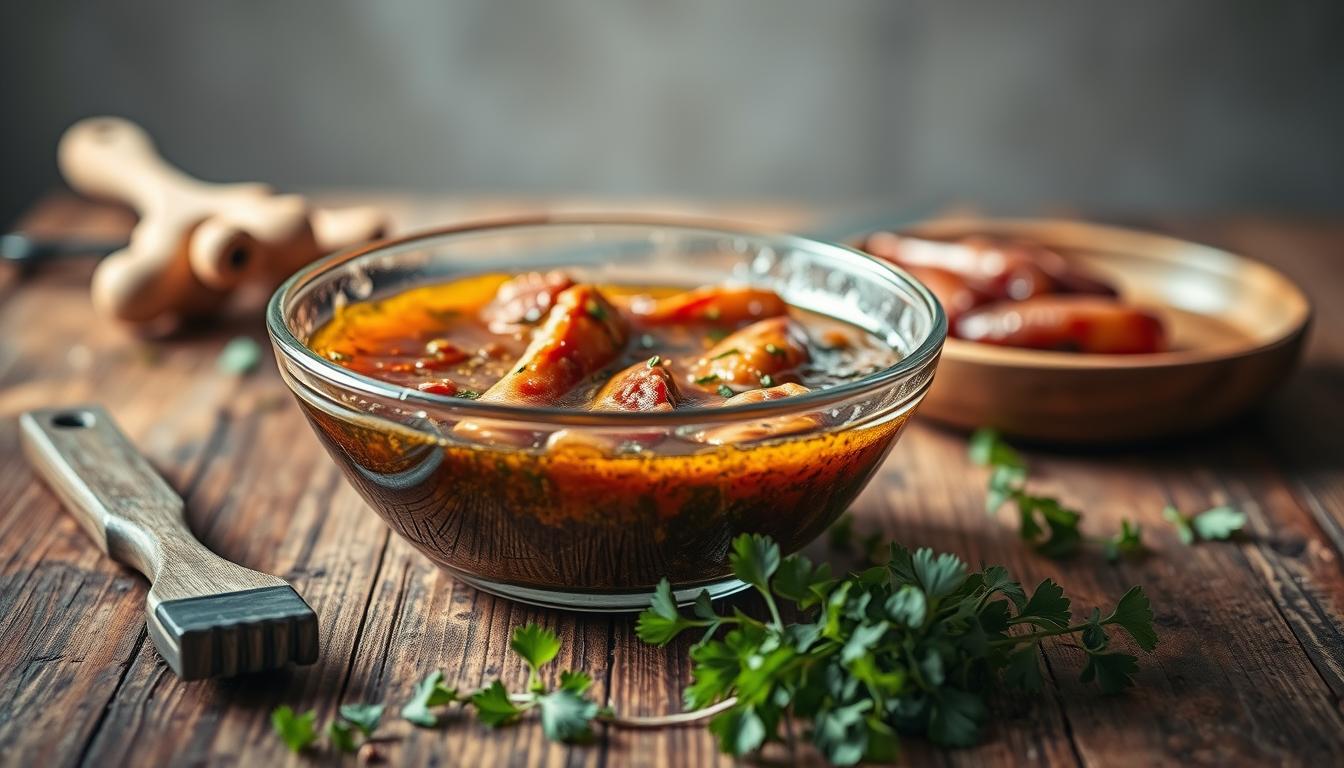Best Venison Marinade for Tender and Flavorful Meat
The first time I hunted a deer, I learned a hard lesson. My excitement turned to disappointment when my venison felt like leather. This moment made me determined to find the best deer meat marinade.
A great venison marinade does more than add flavor. It unlocks the meat’s full potential. Whether it’s from a farm or the wild, the right marinade can make tough meat tender and flavorful.
Learning about venison marinades can take your cooking to the next level. Your marinade is not just a recipe. It’s a way to make every bite tender, flavorful, and unforgettable.
Table of Contents
Understanding the Unique Properties of Venison
Venison is a special red meat that’s different from beef. It has unique traits that make it a challenge but also rewarding to cook. Knowing how to prepare a wild game marinade is key to making tasty meals.
Venison is very lean, with less than 1% fat. This means it needs special care when cooking. Your marinade is crucial for keeping it moist and flavorful.
Why Deer Meat Requires Special Treatment
Venison needs careful handling because of its special makeup. It has a strong flavor and tender texture. But, it can dry out or become tough if not cooked right. A good marinade can help avoid these problems.
- Extremely low fat content
- Intense, robust flavor profile
- Higher risk of becoming tough when overcooked
Differences Between Wild and Farm-Raised Venison
The taste and texture of venison vary based on where it comes from. Wild venison has a stronger, more varied flavor. Farm-raised venison is milder and more consistent. Your marinade can help balance these differences.
Common Challenges with Cooking Venison
Cooking venison requires careful attention. Its low fat can make it dry quickly. Recommended cooking strategies include:
- Cook to medium-rare (around 145°F)
- Use high-heat cooking methods
- Incorporate a moisture-rich marinade
- Consider wrapping in bacon for added moisture
By understanding venison’s unique qualities, you can make delicious dishes that highlight its exceptional taste and texture.
Essential Components of a Perfect Venison Marinade
To make the perfect game meat tenderizer for venison, you need to know the key parts. Your marinade does more than just add flavor. It breaks down the meat’s muscle fibers and adds rich taste to every bite.
Core Marinade Components
A great venison seasoning has four main parts:
- Acids: Tenderize and flavor the meat
- Oils: Keep the meat moist and spread out the seasonings
- Herbs and Spices: Bring depth and complexity
- Sweeteners: Balance the flavors and help with caramelization
Acid Ingredients for Tenderization
The acid part of your marinade is key for tenderizing venison. Here are some strong tenderizers:
| Acid Type | Flavor Profile | Tenderizing Strength |
|---|---|---|
| Balsamic Vinegar | Rich, complex | Moderate |
| Citrus Juice | Bright, zesty | High |
| Red Wine | Robust, deep | Moderate to High |
Remember, marinating venison takes time. Aim for 4-8 hours to get the meat tender and flavorful.
Pro tip: Always marinate in the refrigerator to prevent bacterial growth and ensure food safety.
Your venison seasoning should mix well with the meat’s natural taste. Try different mixes to find your favorite marinade.
The Science Behind Meat Tenderization
Turning tough deer meat into a tasty dish needs a grasp of meat tenderization science. Knowing how marinades work can greatly improve your wild venison recipes.
The key to a great deer meat rub is breaking down muscle fibers. This is done by choosing the right ingredients. Marinades have different parts that help soften the meat.
Role of Acid in Breaking Down Muscle Fibers
Acidic ingredients are key tenderizers for venison. They do several things:
- Break down protein structures
- Weaken tough muscle connective tissues
- Let seasonings get deeper into the meat
Impact of Enzymes on Meat Texture
Natural enzymes in fruits like pineapple and papaya change meat texture a lot. These enzymes act like tiny meat softeners. They help break down protein bonds.
Optimal Marinating Times for Different Cuts
How long to marinate depends on the venison cut. Here’s a basic guide:
- Tender cuts (backstrap): 2-4 hours
- Medium-tough cuts: 4-8 hours
- Tougher cuts: 8-12 hours
Grasping these scientific basics will make your wild venison recipes tender and full of flavor. They’ll surely impress everyone.
Classic Venison Marinade Recipe
Making the perfect venison marinade is all about finding the right mix of ingredients. It turns game meat into a dish you’ll love. Your marinade will make the meat tender and less gamey, making it more enjoyable to eat.
The best venison marinade has a few key parts. They work together to make your game meat taste amazing:
- Olive oil keeps the meat moist and adds flavor
- Acidic ingredients break down tough meat
- Aromatic herbs add depth to the flavor
- Seasonings enhance the meat’s natural taste
Here’s a simple recipe to make your venison marinade delicious:
- Start with 1/2 cup olive oil
- Add 1/4 cup red wine vinegar
- Minced 4 garlic cloves
- Chop fresh rosemary and thyme
- Mix everything in a glass bowl
Choosing the right ingredients is crucial for reducing the gamey taste. Red wine vinegar tenderizes the meat and cuts down on wild game flavors. Fresh herbs like rosemary and thyme add complex tastes that go well with venison.
Pro tip: Always marinate venison in a non-reactive container and refrigerate for maximum flavor absorption.
Your marinade will not only make the meat taste better but also make it tender and juicy. It will impress anyone who loves game meat.
Wine and Balsamic Based Marinade Variations
Improving your venison marinade means exploring fancy flavor mixes. Wine and balsamic vinegar are key to making deer meat marinade a gourmet delight.
Red Wine Marinade Magic
A good red wine venison marinade makes meat tender and tasty. Pick strong wines like:
- Cabernet Sauvignon
- Merlot
- Syrah
Balsamic Vinegar’s Unique Properties
Balsamic vinegar adds special benefits to your venison marinade. Its acidity softens meat while adding a complex, slightly sweet undertone.
Herb and Spice Combinations
Boost your venison marinade with the right herbs and spices. Try these mixes:
- Rosemary and thyme
- Sage and garlic
- Black pepper and juniper berries
“The right marinade transforms good venison into an extraordinary culinary experience.”
Try out these wine and balsamic marinades to discover new flavors in your deer meat. Each bite will be tender, rich, and unforgettable.
Apple and Ginger Flavor Enhancement

To make a great wild game marinade, you need to know how certain ingredients can change venison’s strong taste. Apple and ginger are key in making your venison seasoning better. They add depth and complexity to the meat.
Apples do more than just add sweetness. The acids in apple juice help make the venison meat tender. Ginger adds a spicy kick that balances out the gamey taste.
- Apple juice provides natural enzymes for meat tenderization
- Ginger introduces a warming, spicy undertone
- Combination creates a complex flavor profile for wild game marinade
“The secret to an outstanding venison marinade is finding the perfect balance between sweetness and spice.” – Renowned Wild Game Chef
When making your venison seasoning, mix apple and ginger carefully. Here’s a mix to try:
- 1/2 cup fresh apple juice
- 2 tablespoons grated fresh ginger
- Minced garlic
- Olive oil
- Salt and black pepper
Play with these ingredients to make a marinade that makes your venison stand out. The trick is to let the flavors soak into the meat fully.
Best Cuts of Venison for Marinating
Choosing the right cut of venison is key to a tasty game meat dish. Each cut needs a special marinating approach. Knowing these differences can make your marinade go from good to great.
Venison has many cuts, each with its own traits and best cooking methods. A game meat tenderizer is crucial for the tougher parts of the deer.
Backstrap Preparation Techniques
The backstrap is the most sought-after venison cut. It’s tender and full of flavor. Here’s how to prepare it:
- Remove all silver skin before marinating
- Use a gentle red meat marinade that complements the meat’s natural flavor
- Limit marinating time to 4-6 hours to prevent texture breakdown
Tenderloin Marinating Guidelines
Tenderloin needs gentle care to keep its texture perfect. Your marinating plan should be light yet flavorful:
- Apply a light game meat tenderizer
- Marinate for no more than 2-3 hours
- Use acidic ingredients sparingly
Solutions for Tough Cuts
Challenging cuts like shoulder or shank need special treatment. Here’s how to tenderize them:
| Cut | Marinating Time | Tenderizing Method |
|---|---|---|
| Shoulder | 12-24 hours | Enzymatic marinade |
| Shank | 24-36 hours | Acidic red meat marinade |
| Neck | 18-24 hours | Slow-cooking preparation |
By knowing each cut’s special needs, you’ll become a pro at preparing venison. You’ll make dishes that everyone will love.
Proper Marinating Techniques and Times
Mastering the art of marinating wild venison recipes is all about precision and care. The secret to a tasty deer meat rub is knowing the right techniques. These methods turn tough meat into a tender treat.
When getting your venison ready for marinating, pick thinner cuts like backstrap medallions or leg steaks. These cuts soak up flavors better. Marinades can only penetrate about 1/8 inch into the meat.
- Use sealable plastic bags or non-reactive containers
- Ensure complete meat coverage with marinade
- Rotate meat every few hours for even flavor distribution
Marinating time is key for wild venison recipes. Short marination periods work best – usually 4 to 24 hours, depending on the cut. Longer marination can make the meat mushy, especially with acidic marinades.
Important food safety steps include:
- Always marinate in the refrigerator at 40°F or below
- Pat meat dry before cooking to ensure proper browning
- Cook to an internal temperature of 165°F
Pro tip for your deer meat rub: If you want to use the marinade as a sauce, set aside a portion before adding raw meat. Boil any marinade that has touched raw meat for at least 5 minutes to kill bacteria.
Proper marinating transforms venison from tough to tender, creating a memorable dining experience.
Cooking Methods for Marinated Venison
Preparing marinated venison needs care and precision. It turns lean meat into a tasty dish. Choosing the right cooking method is key to enhancing flavor and texture.

Grilling Techniques for Perfect Venison
Grilling is great for venison. Use high heat and quick cooking. For tender cuts like backstrap or tenderloin, follow these steps:
- Preheat grill to high heat
- Cook for 2-3 minutes per side
- Target internal temperature of 120-125°F for medium-rare
- Rest meat for 10-15 minutes after cooking
Pan-Searing Method for Tender Results
Pan-searing is another good way to cook venison. Use a cast-iron skillet for the best results:
- Heat skillet to medium-high
- Add a small amount of oil
- Sear venison for 2-3 minutes per side
- Aim for golden-brown crust
Temperature Control Tips
Controlling temperature is crucial for venison’s texture. Use a meat thermometer to ensure perfect doneness:
“Cooking venison is an art of temperature precision – too long, and you’ll lose its magical tenderness.”
| Doneness Level | Internal Temperature |
|---|---|
| Medium-Rare | 120-125°F |
| Medium | 130-135°F |
| Well-Done | 160°F |
Respecting venison’s unique traits is key. By following these methods, you’ll make your marinated venison a culinary delight.
Storage and Food Safety Guidelines
Storing your deer meat marinade right is key for food safety and keeping your venison tasty. You must follow certain rules to stop bacteria from growing and to enjoy a great meal.
Handling your marinated venison with care is important. Here are some storage tips for your deer meat marinade:
- Refrigerate marinated venison right after you make it
- Store it in airtight containers or sealed plastic bags
- Keep it cold, below 40°F (4°C)
- Use the marinated venison within 24-48 hours
Stopping cross-contamination is vital when dealing with raw venison. Always use different cutting boards and tools for raw meat. Clean all surfaces well after making your venison marinade to avoid health risks.
If you can’t cook the marinated venison right away, you can freeze it. Wrap the meat tightly in freezer-safe packaging, getting rid of as much air as you can. Frozen marinated venison can be stored for up to 3 months without losing quality.
When thawing your marinated venison, thaw it in the fridge, not at room temperature. This slow thawing keeps bacteria away and keeps your deer meat marinade good.
Safety tip: Never reuse marinades that have been in contact with raw meat without first boiling them thoroughly.
Common Marinating Mistakes to Avoid
Making a great wild game marinade needs care and knowledge. Many home cooks make mistakes that can mess up the taste and texture of venison. Knowing these common errors can help you make your venison seasoning stand out.
- Over-Marinating Trap: Leaving venison in marinade too long breaks down muscle fibers, creating a mushy texture
- Excessive Salt Content: Can overwhelm the natural game meat flavor
- Improper Marinade Coverage: Leads to uneven flavor distribution
Timing is key when making your wild game marinade. Different cuts of venison need different marinating times. Tender cuts like backstrap need less time, while tougher cuts benefit from longer marinating.
| Venison Cut | Recommended Marinade Time | Risk Factor |
|---|---|---|
| Backstrap | 2-4 hours | Low tissue breakdown risk |
| Shoulder | 6-8 hours | Medium tissue breakdown risk |
| Tough Cuts | 8-12 hours | High tissue breakdown risk |
Don’t use metal containers for marinating. Acidic ingredients can react with metal, changing the taste of your venison seasoning. Always pat meat dry before cooking to ensure proper searing and flavor development.
“Great venison starts with understanding its unique marinating requirements.”
By avoiding these common mistakes, you’ll improve your wild game marinade skills. You’ll make delicious venison dishes that will wow even the pickiest eaters.
Conclusion
Exploring wild venison recipes can really boost your cooking skills. It lets you use the lean, tasty meat to its fullest. A good deer meat rub can make even tough cuts of venison taste amazing.
Starting your marinating journey means understanding venison’s unique qualities. It’s low in fat but high in protein, so it needs special care. Using acidic ingredients like buttermilk or vinegar helps tenderize the meat and reduce gamey tastes.
Trying out different marinades helps you create your own special venison recipes. Whether it’s backstrap, tenderloin, or ground venison, the right mix of ingredients can make it taste like a gourmet dish. Remember, patience and skill are crucial for getting the best results from your deer meat rub and marinades.
As you keep learning and improving, you’ll find that venison is a thrilling ingredient to work with. Each cut offers a chance to try new things, learn, and make unforgettable meals. Your skills will turn venison into a highlight of your dining experiences.

